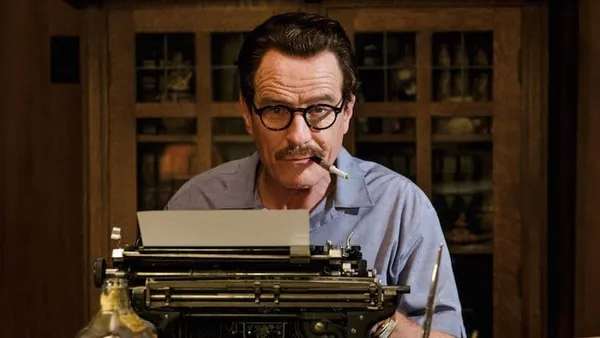Eye For Film >> Movies >> Trumbo (2015) Film Review
Trumbo
Reviewed by: Owen Van Spall

The Hollywood blacklist, the paranoia-driven anti-Communist purge that saw thousands of Hollywood personnel put out of work and publicly shamed during the Cold War, seems like dark subject matter for any drama that seeks to explore how the many jobless victims coped. But director Jay Roach and screenwriter John McNamara deploy a light touch in their dramatisation of the mischievous ways screenwriter Dalton Trumbo (played with gusto by Breaking Bad’s Bryan Cranston) got around the blacklist, along with his eclectic group of paycheck-hungry comrades. It is a shame though that, despite this period being so rich in potential subject matter, this admittedly handsomely mounted, nimble and quite funny film chooses to take a pretty much conventional ride to a victory-lap finish.
For the uninitiated, the Hollywood blacklisting emerged from the hearings of the spookily named House Committee on Un-American Activities in 1947. As the red-hunting Senator Joseph McCarthy rampaged across America, smelling communists in every corner, the American screenwriting profession came under scrutiny, as did other talents. The ‘Hollywood Ten’ remains one of the best-known stories of the McCarthy era, and writer Dalton Trumbo (a member of the American Communist party) and others' refusal to testify about their knowledge of the industry’s Communist sympathisers is one of the enduring myths of the period, the lonely stand of a heroic few. In other words, it is perfect material for a Hollywood screenplay.

The irony of this seems not to have been lost on Roach, who constructs his film in such a way that it feels like it could've been made during the period it is set in. Dramatic license has been taken. This is a brightly lit film, spritely in tone, seamlessly stuffed with classic plot contrivances (count the number of times a character will notice something on the TV right in front of them as they are on a phone call talking about the same issue), and set to rousing music, a story that digs the knife into Hollywood, but clumsily and never too deep. Even if you didn't know the history, you would never doubt watching this that the good guys are going get home safe in the end.
Bryan Cranston seems to be having a blast playing Trumbo, the Hollywood screenwriter who would go on to pen Academy Award winners Roman Holiday and The Brave One, as well as the blockbuster epics Spartacus and Exodus, which helped bring him back into the mainstream. Trumbo is a debonair rake of a figure, all checked blazers and shiny cigarette holders, a classic eccentric egotistical archetype from the Hollywood heyday. He necks fine bourbon regularly, and speaks like a character from one of his screenplays, as his typically exasperated colleague and fellow left wing traveller Arlen Hird (a low-key but sympathetic Louis CK) acidly observes. Trumbo is a perfectly pleasant guy to spend two hours of film time with, even if the screenplay doesn’t really gift him with a huge amount of complexity.
The narrative gets the blacklisting and media furore out of the way quickly, leaving much of the running time for Trumbo and Hird’s attempts to find a way round the blacklist, which they do by ruthlessly exploiting Hollywood’s need for them. It turns out that is there is one thing Hollywood hates more than a Communist, it is a series of box office flops. Soon Trumbo and a team of out-of-work writers are getting regular work, mcuh of it coming from the churn factory known as King Pictures, run by the booming self-declared pussy-hound Frank King (John Goodman, seemingly channeling his role from Argo and deploying his skill at roaring out profane one-liners).
This is where the film is at its most purely enjoyable and sly, as we watch Trumbo and his louche companions hop between studio offices (decked out with gorgeous classic posters) and low-lit smoky bars, artfully exploiting the hypocrisy of tinsel town, bashing out C-grade scripts about giant aliens and outlaws, all while getting through cartons of cigarettes. Roach and the filmmakers clearly love this period too much to make it seem too scary.
It is quite interesting to see the system Trumbo and his team set up to ensure work kept coming through their doors; scripts being delivered in the middle of the night direct to studios via family members, fake names being attached to scripts, or name swaps being arranged with other writers who weren’t box office poison. As a result of Trumbo’s blacklisting, several Academy Awards for writing went unclaimed at the Oscars, a strange occurrence which we see via archive footage. His English writer friend Ian McLellan Hunter (Alan Tudyk, with an odd accent) actually ends up taking home the Oscar for Roman Holiday as he allowed Trumbo to use his name as cover, resulting in the strange situation of him trying to hand it over to an embarrassed Trumbo in a diner. Trumbo did get credit for that film eventually… in 2011.
In moments like this Roach does capture this sense of banality around all the barely secret manoeuvring (Trumbo and his friends are hardly master spies), which is something Trumbo is shown as being entirely aware of. He is counting on the ludicrousness of it all eventually collapsing the blacklist system, although the film does touch upon the contradictory nature of such a plan in that it conveniently synchs with Trumbo’s ambitions for money and glory. This increasingly irks the more firebrand leftie Hird, who hates having to write anything, even shit, without his name on it and worries that they've lost their way. Michael Stuhlbarg as Edward G Robinson, the Little Caesar actor and friend of Trumbo’s, is also there to remind us of how even those who named names suffered; damned if they did, damned if they didn’t. The film never really slows down to explore these debates about creativity, art and morals though, it is too busy getting to the happy ending.
There isn’t much for Diane Lane, as Trumbo’s wife Cleo, to do except be loyal and enact the standard routine of reminding her husband of the times when he is losing himself in his cause, likewise Elle Fanning as his feisty elder daughter. Helen Mirren is quite fun as the infamous and fabulously attired gossip columnist Hedda Hopper, out to do her bit to defend Uncle Sam by cooly delivering threats and barbs through a cloud of cigarette smoke. But Hopper and the other villains are never any real threat, we know all these exaggerated bad guys will get both righteous comeuppance and humiliation. Where the jaunty approach really works against the film is when it tries to slow down to take a more sombre tone, to remind us of those writers who never recovered from the blacklist, some of whom took their own lives. Though enjoyable, overall this film isn’t quite funny or sharp enough to work as a comedy first and drama second, and it never surprises, leaving it feeling like a missed opportunity, especially given how much rich source material there is here for an examination of Hollywood’s period of shame.
Reviewed on: 10 Oct 2015

















